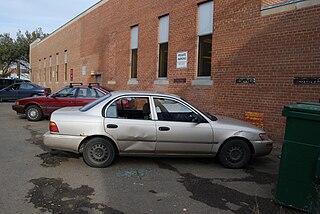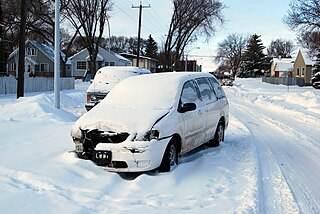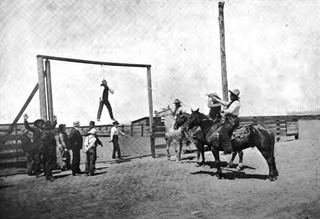
An automated teller machine (ATM) or cash machine is an electronic telecommunications device that enables customers of financial institutions to perform financial transactions, such as cash withdrawals, deposits, funds transfers, balance inquiries or account information inquiries, at any time and without the need for direct interaction with bank staff.

Identity theft occurs when someone uses another person's personal identifying information, like their name, identifying number, or credit card number, without their permission, to commit fraud or other crimes. The term identity theft was coined in 1964. Since that time, the definition of identity theft has been statutorily defined throughout both the U.K. and the U.S. as the theft of personally identifiable information. Identity theft deliberately uses someone else's identity as a method to gain financial advantages or obtain credit and other benefits, and perhaps to cause other person's disadvantages or loss. The person whose identity has been stolen may suffer adverse consequences, especially if they are falsely held responsible for the perpetrator's actions. Personally identifiable information generally includes a person's name, date of birth, social security number, driver's license number, bank account or credit card numbers, PINs, electronic signatures, fingerprints, passwords, or any other information that can be used to access a person's financial resources.

Motor vehicle theft is the criminal act of stealing or attempting to steal a motor vehicle. Nationwide in the United States in 2020, there were 810,400 vehicles reported stolen, up from 724,872 in 2019. Property losses due to motor vehicle theft in 2020 were estimated at $7.4 billion. There were 505,100 car thefts in the EU in 2019, a 43% decrease from 2008.
Bank fraud is the use of potentially illegal means to obtain money, assets, or other property owned or held by a financial institution, or to obtain money from depositors by fraudulently posing as a bank or other financial institution. In many instances, bank fraud is a criminal offence. While the specific elements of particular banking fraud laws vary depending on jurisdictions, the term bank fraud applies to actions that employ a scheme or artifice, as opposed to bank robbery or theft. For this reason, bank fraud is sometimes considered a white-collar crime.
A rental agreement is a contract of rental, usually written, between the owner of a property and a renter who desires to have temporary possession of the property; it is distinguished from a lease, which is more typically for a fixed term. As a minimum, the agreement identifies the parties, the property, the term of the rental, and the amount of rent for the term. The owner of the property may be referred to as the lessor and the renter as the lessee.

Metal theft is "the theft of items for the value of their constituent metals". It usually increases when worldwide prices for scrap metal rise, as has happened dramatically due to rapid industrialization in India and China. Apart from precious metals like gold and silver, the metals most commonly stolen are non-ferrous metals such as copper, aluminium, brass, and bronze. However, even cast iron and steel are seeing higher rates of theft due to increased scrap metal prices.

A fence, also known as a receiver, mover, or moving man, is an individual who knowingly buys stolen goods in order to later resell them for profit. The fence acts as a middleman between thieves and the eventual buyers of stolen goods who may not be aware that the goods are stolen.

A bait car, also called a decoy car, hot car, or trap car, is a vehicle used by law enforcement agencies to capture car thieves or thieves who steal items from cars. The vehicles are modified with audio/video surveillance technology, and can be remotely monitored and controlled. Those set up to catch car thieves may include GPS tracking. A "kill switch" may be installed in the vehicle allowing police to remotely disable the engine and lock all doors, preventing escape. A car set up to catch thieves who steal items from cars may be disabled so that it cannot be started and have specially prepared "bait property".
VIN etching is a countermeasure to motor vehicle theft, that involves etching a vehicle's VIN onto its windows to reduce the value of a stolen vehicle to thieves.

Joyriding refers to driving or riding in a stolen vehicle, most commonly a car, with no particular goal other than the pleasure or thrill of doing so or to impress other people. The term "Joy Riding" was coined by a New York judge in 1908.
Identity fraud is the use by one person of another person's personal information, without authorization, to commit a crime or to deceive or defraud that other person or a third person. Most identity fraud is committed in the context of financial advantages, such as accessing a victim's credit card, bank accounts, or loan accounts. False or forged identity documents have been used in criminal activity or in dealings with government agencies, such as immigration. Today, the identities of real persons are often used in the preparation of these false documents.
United Rentals, Inc. is the world's largest equipment rental company, with about 13 percent of the North American market share as of 2019. It owns the largest rental fleet in the world with about 660,000 rental units totaling about $15.97 billion in original equipment cost (OEC). The company has a combined total of 1,350 locations- an integrated network of 1,301 rental locations in North America, 13 in Europe, 28 in Australia and 18 in New Zealand. In North America, the company operates in 49 states and every Canadian province, Puerto Rico and four European countries. In 2017, United Rentals' revenue totaled more than $6.64 billion, with over $1.35 billion in profit. It is ranked #424 on the Fortune 500, and #1183 on the Forbes Global 2000 list of the world's largest public companies.
Property crime is a category of crime, usually involving private property, that includes, among other crimes, burglary, larceny, theft, motor vehicle theft, arson, shoplifting, and vandalism. Property crime is a crime to obtain money, property, or some other benefit. This may involve force, or the threat of force, in cases like robbery or extortion. Since these crimes are committed in order to enrich the perpetrator they are considered property crimes. Crimes against property are divided into two groups: destroyed property and stolen property. When property is destroyed, it could be called arson or vandalism. Examples of the act of stealing property is robbery or embezzlement.

Horse theft is the crime of stealing horses. A person engaged in stealing horses is known as a horse thief. Historically, punishments were often severe for horse theft, with several cultures pronouncing the sentence of death upon actual or presumed thieves. Several societies were formed in the United States to prevent horse theft and apprehend horse thieves. However, horse theft continues to occur throughout the world, as horses are stolen for their meat, for ransom, or in disputes between their owners and other persons. Horse theft today is comparable to automobile theft, a crime punishable by felony jail time. Both horses and cars are valuable commodities.
Credit card fraud is an inclusive term for fraud committed using a payment card, such as a credit card or debit card. The purpose may be to obtain goods or services or to make payment to another account, which is controlled by a criminal. The Payment Card Industry Data Security Standard is the data security standard created to help financial institutions process card payments securely and reduce card fraud.
Sammons Enterprises, Inc. is a diverse holding company composed of financial services, industrial equipment, real estate investment, and infrastructure businesses operating in six countries. Headquartered in Dallas, Texas (US), Sammons was established by Charles Sammons in 1938.

Albert Gonzalez is an American computer hacker and computer criminal who is accused of masterminding the combined credit card theft and subsequent reselling of more than 170 million card and ATM numbers from 2005 to 2007: the biggest such fraud in history. Gonzalez and his accomplices used SQL injection to deploy backdoors on several corporate systems in order to launch packet sniffing attacks which allowed him to steal computer data from internal corporate networks.
Getaround is an online car sharing or peer-to-peer carsharing service that connects drivers who need to reserve cars with car owners who share their cars in exchange for payment.
Identity theft involves obtaining somebody else's identifying information and using it for a criminal purpose. Most often that purpose is to commit financial fraud, such as by obtaining loans or credits in the name of the person whose identity has been stolen. Stolen identifying information might also be used for other reasons, such as to obtain identification cards or for purposes of employment by somebody not legally authorized to work in the United States.

Package theft, also known as porch piracy, is the theft of a package or parcel. It can occur anywhere in the distribution channel including theft of packages left at a household. More specifically, it has been defined as, "Taking possession of a package or its contents, outside of a residence or business, where it has been commercially delivered or has been left for commercial pickup, with intent to deprive the rightful owner of the contents. People who steal packages are known as "porch pirates or porch bandits" "










